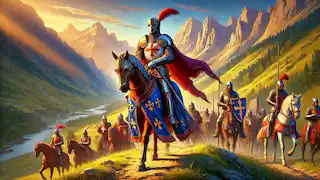The Ambush
The sun hung low in the sky, casting long shadows over the Pyrenees as Charlemagne’s rearguard made its way through the narrow pass of Roncevaux. Leading this valiant group was Count Roland, Charlemagne’s nephew and one of the Twelve Peers of France. Clad in gleaming armor, Roland embodied the spirit of chivalry and courage.
Unknown to Roland and his men, an ambush awaited. The treacherous Ganelon, driven by envy and greed, had betrayed them to the Saracens. The enemy lay in wait, their dark figures hidden among the rocks and trees, ready to strike at the signal of their leader, Marsile. Ganelon’s betrayal was not just an act of treason; it was a calculated move to eliminate Roland, whom he saw as his greatest rival.
The rearguard marched with confidence, unaware of the peril that loomed ahead. Roland, riding his warhorse Veillantif, scanned the horizon with a sense of duty and pride. Beside him rode his closest companions: Oliver, wise and brave, and Archbishop Turpin, a warrior of faith. Their camaraderie and loyalty to each other were the bedrock of their strength.
As the evening descended, the Saracens launched their attack. The valley echoed with the clash of swords and the cries of battle. Roland and his men fought valiantly, their swords flashing in the fading light. Roland’s legendary sword, Durandal, cut through the enemy with unmatched ferocity. Each strike was a testament to his skill and determination, and the Franks’ courage was unwavering despite the overwhelming odds.
Roland’s Dilemma
Despite their bravery, the Franks were heavily outnumbered. Oliver urged Roland to blow his oliphant, a horn of ivory, to summon Charlemagne’s aid. But Roland, proud and resolute, refused. He did not wish to bring shame upon himself or his king by admitting they were in dire need.
“Blow your horn, Roland!” Oliver implored. “Our lives and the honor of France are at stake!”
But Roland shook his head, his eyes blazing with determination. “I will not call for help. We shall fight and die with honor.”
The battle raged on, the ground soaked with the blood of both friend and foe. Roland’s mind was a whirlwind of thoughts—he considered the implications of calling for aid. He worried about appearing weak and tarnishing the honor of the rearguard. The weight of his decision bore heavily on his shoulders as he continued to fight.
Archbishop Turpin, seeing the dire situation, spoke words of encouragement to the men, urging them to hold fast in their faith and courage. “Stand strong, men of France! Our cause is just, and our bravery shall be remembered for eternity!”
The Last Stand
As the hours wore on, the Franks began to fall, one by one. Roland, seeing his men perish, finally understood the gravity of their situation. With a heavy heart, he lifted the oliphant to his lips and blew with all his might. The sound echoed through the mountains, a desperate call for aid.
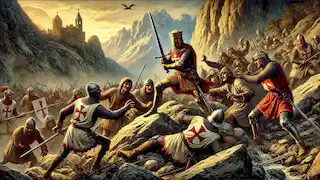
Miles away, Charlemagne heard the horn’s mournful note. He knew it could only mean one thing: Roland was in peril. Without hesitation, he turned his army back towards the pass, spurring his men to ride faster, their hearts filled with fear for their comrades.
Back at Roncevaux, the battle was nearing its end. Roland, wounded and weary, fought with a strength born of desperation. Oliver lay dead at his feet, and Turpin, though gravely injured, continued to fight on, his faith unwavering. The sight of his fallen comrades fueled Roland’s fury, and he vowed to avenge their deaths.
The Saracens, emboldened by their numbers, pressed on relentlessly. Roland, despite his injuries, fought like a lion, his spirit unbroken. He wielded Durandal with unmatched skill, cutting down any who dared approach. The legend of his might grew with each passing moment, inspiring his remaining men to fight with renewed vigor.
The Fall of Roland
In the end, the Franks could hold out no longer. Roland, surrounded by the bodies of his fallen friends, made his final stand. He swung Durandal with the last of his strength, felling many of the enemy before he too succumbed to his wounds.
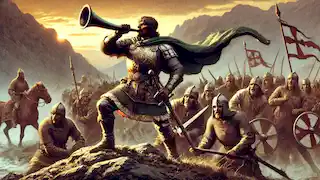
As he lay dying, Roland took the oliphant once more and blew a final, weak blast. He knew Charlemagne was coming, but it was too late for him and his men. With his last breath, he prayed for his king and for France, his heart filled with regret and pride.
Charlemagne arrived too late to save Roland, but he avenged him with a fury that left no Saracen alive. The valley of Roncevaux became a tomb for both the fallen Franks and their enemies, a testament to the bravery and sacrifice of Roland and his men.
Charlemagne’s grief was palpable as he surveyed the battlefield. He knelt beside Roland’s body, tears streaming down his face. “You fought bravely, my nephew,” he whispered. “Your sacrifice shall not be forgotten.”
The Mourning of France
Charlemagne ordered that the bodies of the fallen be taken back to France with honor. As the king’s army made their somber journey home, the news of Roland’s death spread throughout the land. The entire kingdom mourned the loss of their hero.
Back in France, the funerals were grand and solemn. The fallen knights were buried with the highest honors, and Roland’s tomb became a site of pilgrimage. People from all over came to pay their respects to the hero who had given his life for his king and country.
Ganelon's Fate
Meanwhile, Ganelon, the traitor, was brought before Charlemagne. His betrayal had been discovered, and he stood trial for his heinous act. The trial was swift and just. Ganelon was condemned to a traitor’s death, and his name was forever cursed. His punishment served as a stark reminder of the consequences of treachery.
Charlemagne decreed that Ganelon’s lands and titles be stripped from his family. His name was erased from the annals of honor, and his deeds were remembered only as a warning to others. The stain of his treachery was a heavy burden for his descendants to bear.
The Song of Roland
In the years that followed, songs and poems were written to commemorate the Battle of Roncevaux and the heroism of Roland. The most famous of these was the epic poem, “The Song of Roland,” which immortalized the bravery, loyalty, and tragic fate of the noble knight.
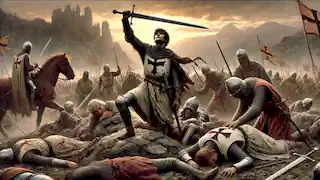
Minstrels traveled from town to town, singing of Roland’s deeds and the valiant stand of the Franks at Roncevaux. The story became a symbol of French valor and chivalry, inspiring generations of knights to come. The legacy of Roland lived on, a beacon of heroism in the annals of history.
The poem captured the imagination of the people, who found in Roland a hero whose virtues they could aspire to. His story was taught to children, ensuring that the memory of his sacrifice would never fade. The values of bravery, loyalty, and sacrifice became deeply ingrained in the cultural fabric of France.
The Legacy
Charlemagne’s reign continued, and he carried the memory of Roland with him always. He often visited Roland’s tomb, drawing strength from the courage of his fallen nephew. The king’s resolve to protect his realm was fortified by the example set by Roland and the Twelve Peers.
In honor of Roland, Charlemagne established new orders of knighthood, dedicated to upholding the principles of chivalry. These knights swore oaths to defend the weak, uphold justice, and live with honor. The spirit of Roland guided their actions, and they carried his legacy into future battles.
The Eternal Hero
Even as centuries passed, the memory of Roland remained vivid. His story was told and retold, each time with the same reverence and awe. Monuments were erected in his honor, and the oliphant, preserved as a relic, became a symbol of France’s indomitable spirit.
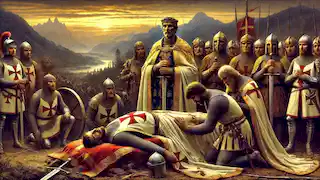
Roland’s influence extended beyond the borders of France. His story was known throughout Europe, and he became a legendary figure in the collective consciousness of medieval Christendom. Knights from other lands looked to Roland as an exemplar of chivalry, and his name was synonymous with heroism.
A Knight's Code
The chivalric code that Roland embodied continued to shape the ideals of knighthood. Honor, loyalty, and courage were not mere words, but principles to live by. The tales of Roland and his peers were a constant reminder of what it meant to be a true knight.
Young squires were trained with the stories of Roland as their guide. They learned that to be a knight was to serve others, to protect the helpless, and to fight for justice. Roland’s legacy ensured that these values were passed down through generations, preserving the noble spirit of knighthood.
The Song's Influence
“The Song of Roland” became more than just a story; it was a cultural treasure. Its influence could be seen in the art, literature, and music of the time. The themes of loyalty and sacrifice resonated deeply with the people, shaping their worldview and their sense of identity.
The epic poem inspired countless works of art, from illuminated manuscripts to grand tapestries depicting the Battle of Roncevaux. The story was performed in grand halls and humble villages alike, uniting the people in a shared heritage of valor and honor.
Roland's Symbolism
The figure of Roland transcended his own time, becoming a symbol of the eternal struggle between good and evil. His fight at Roncevaux was seen as a microcosm of the larger battle between Christian Europe and its enemies. Roland’s steadfastness in the face of overwhelming odds became a source of inspiration for those who faced their own challenges.
In the collective memory of Europe, Roland stood as a paragon of virtue, a knight whose life and death exemplified the highest ideals of chivalry. His story was a reminder that true heroism lies not in victory, but in the willingness to stand firm in the face of overwhelming odds, to fight for what is right, and to honor those who have fallen with our actions and our memories.
The Modern Echo
Even in modern times, the story of Roland continues to resonate. His tale is studied in schools, his deeds are celebrated in festivals, and his name is invoked as a symbol of courage and integrity. The values that Roland lived by are timeless, and his legacy continues to inspire those who hear his story.
In a world that often seems far removed from the age of knights and epic battles, Roland’s example remains relevant. His story teaches us that courage and honor are not bound by time or place. They are qualities that we can all strive for, regardless of the era in which we live.
The Final Rest
Charlemagne, in his later years, often reflected on the lives of those who had fought and died for his cause. Among them, Roland’s memory shone the brightest. The king decreed that an annual ceremony be held at Roland’s tomb, ensuring that his sacrifice would never be forgotten.
During these ceremonies, knights and nobles gathered to honor Roland and the fallen heroes of Roncevaux. They recited passages from “The Song of Roland” and pledged to uphold the values that the noble knight had exemplified. The legacy of Roland was thus enshrined in the hearts of the people and the traditions of the land.
